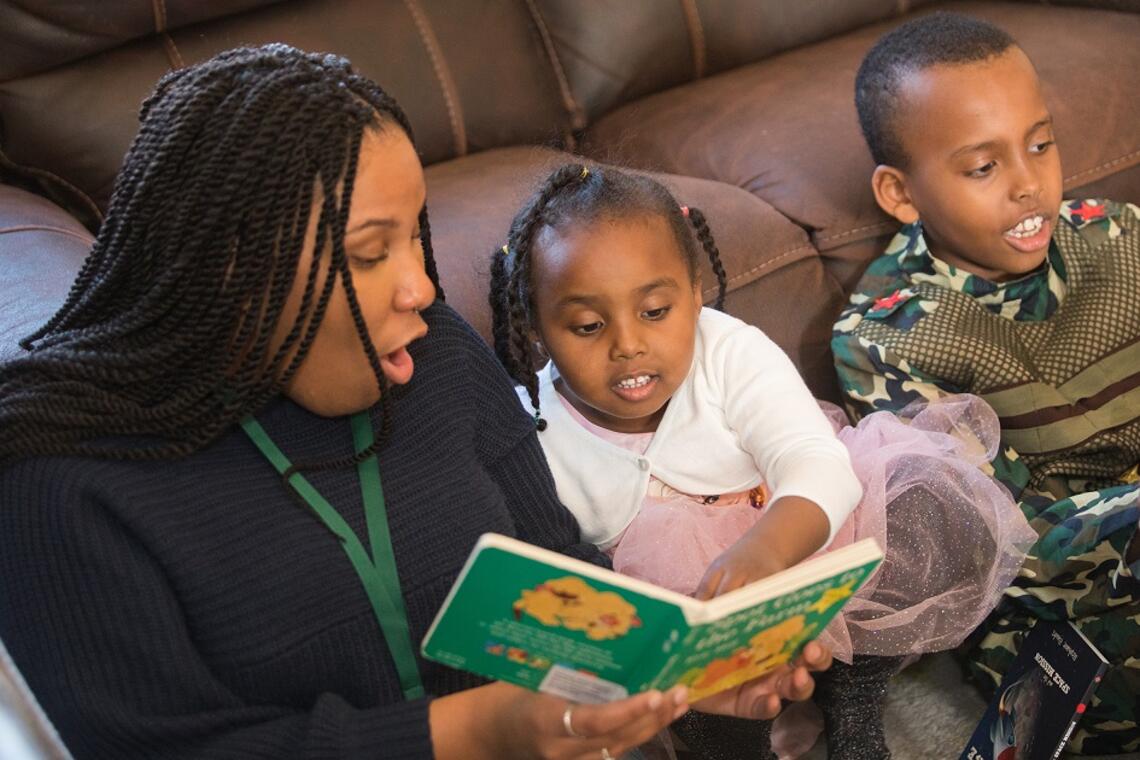We need KCL students who have a passion for reading to join our volunteer team and support the number of families in London we have on our books waiting to be paired with a Reading Volunteer.
As a Doorstep Library reading volunteer, you’ll visit the same families at their homes every week with a backpack full of books to share with the children and encourage their love of reading.
You will:
- Handpick books based on the children’s age, interests, and reading level
- Visit their homes with your volunteer partner for 20-minute reading sessions
- Leave behind a selection of books for the children to borrow for the week
Our unique home-based approach allows our volunteers to build trusting relationships with families, helping them to connect with the community and equip them with the skills they need to succeed later in life.
When and Where?
We have volunteer opportunities in: Hammersmith, Parsons Green, Fulham Broadway, Shepherds Bush, East Acton, Latimer Road, Euston, Kings Cross, Marylebone, Edgware Road, Queens Park, Pimlico, Brixton, Tulse Hill and World’s End (south of Kings Road).
- Time commitment: One evening a week (Regular Volunteer), one evening every other week (Semi-Regular Volunteer) or once every 3 weeks (Stand-In Volunteer) during school term times
- Hours per week: 2.5
- Days: Our projects run on Mondays, Tuesdays, or Thursdays depending on where you are based from 4:30pm – 7:00pm
- It's incredibly fun! You get to explore your inner child and share your passion for books and reading.
- You will be a part of the Doorstep Library community of families, volunteers and staff members.
- You can make a real difference to the lives of others.
- You give back to the community you live in or the community you visit every week.
- You build your confidence and improve your self-esteem.
- You will develop skills and enhance your C.V.
Skills Developed by Doorstep Library Volunteers
- Engaging with families
- Harnessing a truly empathetic and understanding nature to engage with potentially vulnerable families
- Understanding the benefits of consistency when delivering community-focused projects, seeing first-hand how consistency develops meaningful relationships with families on the ground
- Understanding the value of supporting families to access community services and increased knowledge of the types available
- Approaching families with a supportive and friendly nature
- Developing a good understanding of safeguarding and how to prioritise it
- Excellent time management
- Broad experience of working with families across different areas in London from a range of a differing backgrounds
- Thinking on your feet, able to accommodate for last minute changes in children being visited and what they might want to read
Reading sessions
- Employing a good, patient nature with children from a wide variety of ages and backgrounds
- Using active listening to ensure children and families feel heard
- Using a wide range of approaches to create engaging sessions that promote reading for pleasure
- Developing a hands-on understanding of how to work with families in a child-led manner, based on children’s ages and interests
- Encouraging parental engagement in the sessions wherever possible, learning over time the most effective approaches and strategies to achieve this
- Learning through experience, how different reading techniques like phonics support children's reading development
- Learning more about children’s social, emotional and educational development from the early years to late primary school
Planning what books to use
- Develop an understanding of children's literature, expanding knowledge on a termly basis
- Employing an understanding of children’s interests to create a session they will truly enjoy
- Using cooperation and teamwork to agree on how to share planning with volunteer partner
Volunteering logistics
- For regular, weekly volunteers - consistent commitment to a community-focused project alongside a regular volunteer partner working collaboratively
- For stand-in, ad-hoc volunteers - adaptability and flexibility to support the running of community-focused projects
- For stand-in, ad hoc volunteers - the opportunity to volunteer on many different projects, working with different partners and meeting lots of different families and staff members.
- Team working to efficiently manage project logistics each week, i.e. set up and close down
- Use of bespoke database for regular reporting: developing a greater understanding of the types of data organisations capture, and the importance of monitoring and the need for data protection within that
- Be able to make a regular weekly commitment if you are a regular volunteer or volunteer every 3 weeks if you are a Stand-in Volunteer
- Be compliant with our safeguarding procedures, complete an Enhanced DBS and Child Barred List check and provide two references
- Enjoy spending time with children and believe in education for all
- Have comfortable fluency in English
- Be non-judgmental and respectful of a variety of lifestyles and children's learning
- Have excellent communication skills - be able to listen to families and communicate efficiently with Team Leaders (including via text/emails/calls with Doorstep Library staff)
- Be reliable - always attending a pre-agreed session and giving plenty of notice in advance of absences
- Be friendly - to build good relationships with families, your volunteer partner and the rest of the team
- Be confident - to lead the session or mentor a new volunteer
- Be patient, persistent and flexible - tailoring your approach to each family's needs.
Similar Opportunities
Join us at our boutique charity shop in Enfield, EN2, and support our friendly service users as they build work experience and social skills. Flexible timings, ideally a minimum of 4 hours at a time. Help our members develop well-rounded workplace
Join our Weekend Clubs to enjoy fun workshops with our friendly service users. Activities include sports, games, arts, crafts, drama, and London outings. Timings: 10:00am-1:30pm and/or 1:30pm-6:00pm, Saturdays monthly in North London.
10am to 3pm, Mondays and/or Fridays, term-time. Support and mentor young adults with autism and/or mild learning disabilities to develop employment/life skills on our fun daytime project in North London.

